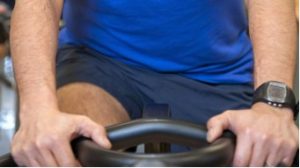Can exercise keep prostate cancer at bay?
UK researchers are carrying out a trial to see if exercise therapy can help men with prostate cancer.
The Sheffield Hallam University team, backed by Cancer Research UK, have a hunch that physical activity can help the body stop tumours from spreading.
They are asking 50 men with prostate cancer that has not yet spread to put the theory to the test for 12 months.
They hope to show that aerobic exercise is a treatment in its own right and should be offered on the NHS.
Half of the men will have weekly supervised exercise sessions, while the other 25 will only be given information about the benefits of exercise for cancer patients.
The researchers will be monitoring the men closely and will check their blood for levels of a protein called PSA, which can help show if prostate cancer is growing and spreading.
If the results are promising and the men can stick with the exercise regime, the researchers say they will do a larger, full-scale trial.
Study leader Dr Liam Bourke said: “It’s early days yet, but the data that we do have suggests that exercise may actually be beneficial in terms of helping regulate the way that cancer cells grow and repair DNA.
“It builds on what we already know and is the first step towards finding out whether exercise could be an effective and practical NHS treatment for localised prostate cancer.”
Prof Malcolm Mason, of Cancer Research, UK said: “Taking exercise is good for all of us, whether or not we have cancer – but this interesting study could help discover whether it’s particularly helpful and a viable, additional treatment for some prostate cancer patients.”
Prostate cancer
- The prostate is a small gland in the pelvis of men
- Each year, more than 43,000 UK men are diagnosed with prostate cancer – that is more than 100 every day
- It is the second most common cause of cancer death in UK men, after lung cancer
- Tumours often develop slowly, so there may be no symptoms for years
- Symptoms can include difficulty urinating or an urge to go more frequently
